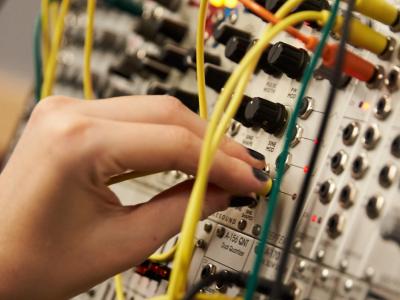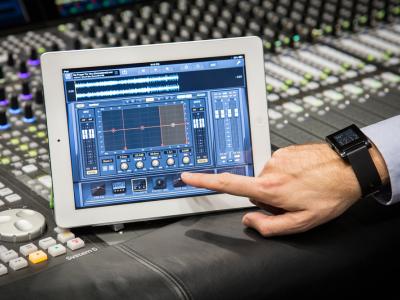What does a Live Sound Systems Engineer do?
Although live sound mix engineers are highly lauded for their ability to control and improve the live music experience, even the best would be powerless without a live sound systems engineer. Part acoustician, part electrician, and all problem-solver, live sound systems engineers are leaders in touring sound crews, where they're responsible for designing rigging and power configurations for sound equipment, optimizing safety and efficiency in the setup, creatively solving acoustic problems, and overseeing load-in and breakdown.
While live sound systems engineers have a wide range of discrete responsibilities, all of their job duties come back to a core goal: to create an effective, safe, balanced, and efficient sound system, in the process providing mix engineers with the tools they need to create excellent sound.
As load-in commences, the systems engineer oversees a team that enacts the rigging design, which is based on the demands of the space and a desired sonic coverage. Once everything is rigged, the systems engineer works with electricians to ensure that power is distributed safely and efficiently to each piece of equipment. Then the systems engineer commences arguably the most important task: dealing with acoustic problems within the space.
Using sound-measuring software to get a sense of pressure levels throughout the space, systems engineers ensure that the audio system will be able to smoothly distribute high, mid, and low frequencies. They also determine and remove problematic resonant frequencies, address troublesome sound reflections (e.g. from a large TV screen hanging from the ceiling of an arena), and strategically position delayed loudspeakers.
Once these tasks are completed, the sound systems engineer is on call for the duration of the show, solving any sound problems that arise. At the end of the show, the systems engineer oversees breakdown and storage of all the sound equipment.
At a Glance
These days, employers usually expect sound systems engineers to have degrees in acoustics, sound engineering, or electrical engineering. However, far more essential is touring experience, whether as a roadie, rigger, or sound system tech. In fact, participating in sound load-in and load-out throughout a tour can teach many of the essentials of the trade.
For the rest, apprenticing with or assisting a working sound systems engineer is the way to go. Experienced and successful systems engineers might build the sound systems for prestigious live events and festivals, or become industry staples and form their own event/touring sound systems companies. They might also choose to settle down, and design and maintain sound systems for a number of local clubs, concert halls, and theaters.
While some live music venues employ in-house sound engineers, the vast majority of live sound systems engineers are independent contractors hired by artists to travel with them on tour, and occasionally by festivals. Because jobs are largely filled via word of mouth, building strong industry relationships and a reputation for consistent work is essential to finding work. Live sound systems engineers with the right skill set might find additional work as live sound mix engineers, studio mixing engineers, lighting techs, or acoustical consultants.
- Acoustics
- Electrical engineering
- Rigging
- Mathematics
- Audio hardware
- Advanced understanding of live sound systems
- Basic understanding of live sound mixing
- Excellent ears (detail, nuance)
- Leadership
Sound systems engineers are organized, detail-oriented, and adaptable. Every show is different, and systems engineers must be thoroughly prepared for acoustical interferences, equipment that doesn't perform as expected, and more. Additionally, it's important that sound systems engineers are good team players and are able to perform their duties to a high level of rigor without the expectation of public recognition. As leaders, they must be capable of delegating tasks to the rest of the touring team: riggers, electricians, roadies, and apprenticing sound techs.
Live sound systems engineers spend a lot of time traveling, as touring is their most consistent source of work. Most of the time, the job consists of short bursts of intense, fast-paced activity during load-in and load-out—although systems engineers have to stay on their toes in the hours between. Those who are less inclined to life on tour might make a living by working festivals, conventions, and other large performance events.











